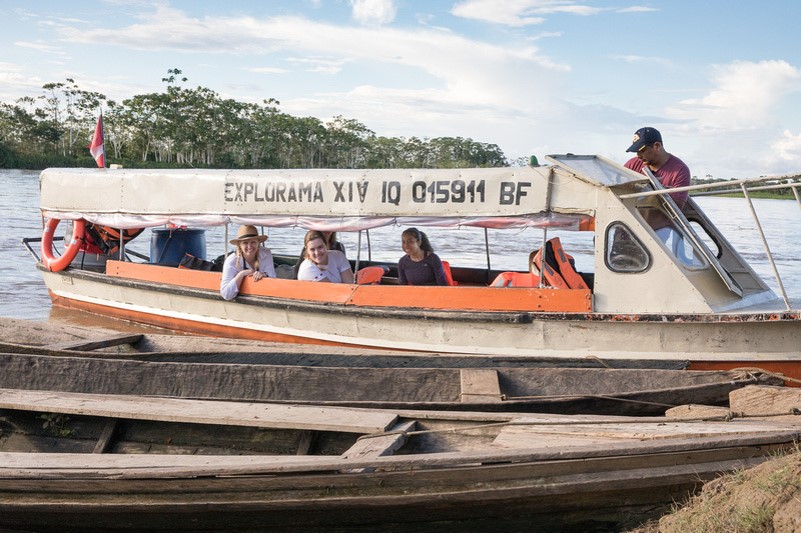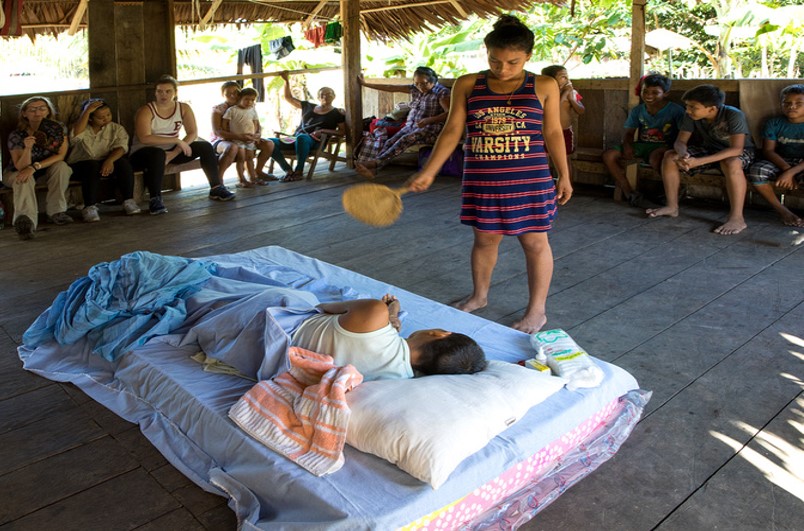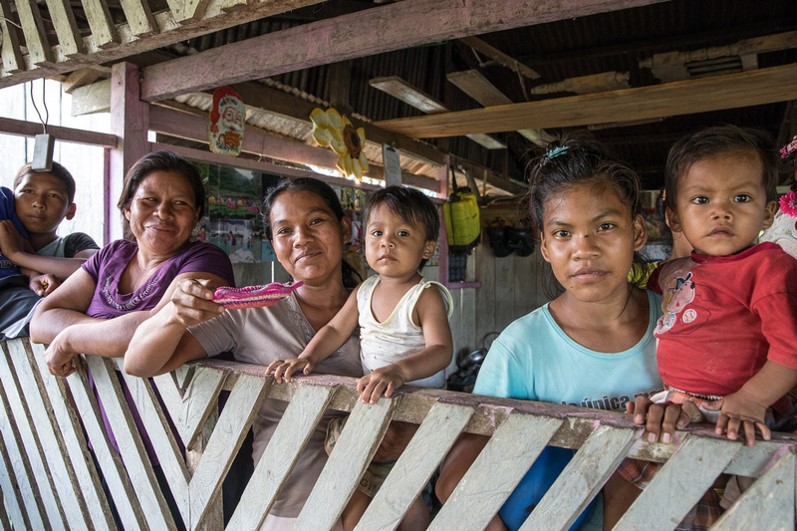
My Site Visit to DB Peru
Once a year, I have the distinct pleasure of doing site visits of some of our grantees. This year Dr. Khandke, our Director of Grants and Partnerships, recommended that I visit DB Peru and Chicuchas Wasi as we want to be visiting recent grantees. Both visits reaffirmed my commitment to Dining for Women, my appreciation of the work we do to select impactful grantees, and my love of our members who are dedicated to global citizenship. Let me tell you first about my visit to DB Peru, our featured grantee in October 2015.
It took three days to get to the Napo River area of the Amazon region in Peru and we were using the fastest modes of transportation – airplanes, taxis, and speedboats. DB Peru serves those who live in small villages of 150-250 people in an area of the jungle where most people do not go on purpose.  The villagers travel by small dugout canoes with wooden paddles, although some of the canoes have small motors attached. The weather is either rainy season or dry season, although “dry” is relative because I was soaking wet from the humidity upon arrival. In the rainy season, the river can rise 30 feet which creates annual cycles affecting their food sources (good and bad), mosquito breeding, housing and village infrastructure, and disease. They live so remotely that they have few government visits, few or no medical visits, and live almost completely off the land. There was a noticeable lack of garbage because they generally do not buy commercial food or products. I would say they were at the “last mile”, but the last mile of infrastructure stopped long before. This is what makes DB Peru so remarkable.
The villagers travel by small dugout canoes with wooden paddles, although some of the canoes have small motors attached. The weather is either rainy season or dry season, although “dry” is relative because I was soaking wet from the humidity upon arrival. In the rainy season, the river can rise 30 feet which creates annual cycles affecting their food sources (good and bad), mosquito breeding, housing and village infrastructure, and disease. They live so remotely that they have few government visits, few or no medical visits, and live almost completely off the land. There was a noticeable lack of garbage because they generally do not buy commercial food or products. I would say they were at the “last mile”, but the last mile of infrastructure stopped long before. This is what makes DB Peru so remarkable.
Diana Bowie, founder of DB Peru, and her VP, Renzo Pena, are known and trusted in the eight villages we visited: people asked for Diana by name. DB Peru serves about 28 villages with medical prevention and interventions, but it took five full days of boat travel to visit the eight that we did. Renzo was welcomed into every village and home and we, the volunteers/observers, were welcomed right along with him. An unforgettable comment from one family was that “DB Peru always comes back.” The reality of that statement is that no one else does.
Before we left the city of Iquitos to head up the Amazon, I was able to meet the head of the municipal women’s health efforts. Jessica was instrumental in creating a partnership between DB Peru’s cervical cancer screenings, cryotherapy, and HPV vaccines (that DFW funded) and the local government for HPV testing. It is really thrilling to share this excerpt from an email I received from Diana Bowie last week:
 “In September we will have an OB/GYN physician with us who will be teaching the nurse midwives (obstetrices) in the clinics how to do cryotherapy, getting ready for them to independently perform this procedure for cervical cancer. The most exciting news is the support and assistance we are getting from Jessica (who you met, I think) and Lita. They are putting together all the logistics for this class over 2 days – one day of theory and one day of practical. They are inviting the obstetrices from 3 clinics for a total of 10. These 3 clinics represent over 200 villages, thousands of women. We will probably continue to put our efforts into training the professionals, and of course make HPV testing more accessible. We are meeting the Minister of Women in Lima next month as well. “
“In September we will have an OB/GYN physician with us who will be teaching the nurse midwives (obstetrices) in the clinics how to do cryotherapy, getting ready for them to independently perform this procedure for cervical cancer. The most exciting news is the support and assistance we are getting from Jessica (who you met, I think) and Lita. They are putting together all the logistics for this class over 2 days – one day of theory and one day of practical. They are inviting the obstetrices from 3 clinics for a total of 10. These 3 clinics represent over 200 villages, thousands of women. We will probably continue to put our efforts into training the professionals, and of course make HPV testing more accessible. We are meeting the Minister of Women in Lima next month as well. “
The grant that we – YOU– funded has leveraged further funded programs from their original goal to reach 500 women and girls to now reaching THOUSANDS every year. Their aim was to transition this program to the government by 2020 and they have already achieved it. This is breathtaking success.
Look for my blog on Chicuchas Wasi in next month’s issue of The Dish!
